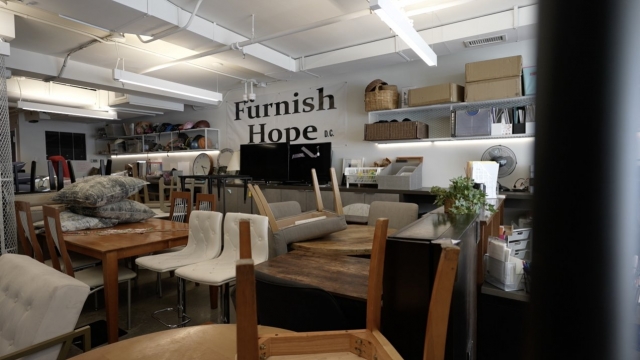On a recent Wednesday morning, a group of young moms were huddled inside a small room on the outskirts of Washington, D.C. One by one, they started to talk about the stresses of raising a family. Among them was Dayona Campbell, who up until recently, was experiencing housing insecurity.
"I was living in a shelter with the kids," she said. "There was just a lot of uncertainty."
Campbell is a resident of Ward 8, which is the most impoverished section of the nation's capital. Last year, Ward 8's median income was $31,000. An estimated 38% of adult residents are in poverty. That number jumps to 50% when talking about kids.
Campbell is raising six kids by herself.
"What am I doing wrong that they are going through this?" Campbell remarked.
SEE MORE: Mental health experts and park rangers team up to battle homelessness
Earlier this year Campbell found a place to live, but after spending all of her money on a security deposit, the 31-year-old had no money left for furniture.
"I knew it was mine but it didn't feel comfortable because we didn't have the things we needed to make it feel like home," she said.
But that is where Niki Mock and her nonprofit FurnishHope D.C. come in.
A few years ago, Mock started realizing many residents of Ward 8 experiencing housing insecurity were finding stable housing but they simply couldn't afford furniture.
She's seen the problem worsen with inflation.
"We go into homes where there is no furniture — none," Mock said.
SEE MORE: In Real Life: Homeless Hero
FurnishHope D.C. takes people's unwanted furniture, then finds new homes for everything from beds to kitchen appliances for those in need. As the nonprofit has gotten more furniture into homes, they've seen a dresser or kitchen table as a way to break the cycle of poverty and housing insecurity.
It also just makes these families happier.
"I really want people to know we do care and we want to help lift them out of poverty or be free to put their energy elsewhere," Mock said.
Seeing the success they've had in Washington, D.C., Mock's hope is to one day expand the program to more cities around the country.
"It's such a big difference. It feels like home," said Taphilah Jackson, one of the program's recipients.
Trending stories at Scrippsnews.com




